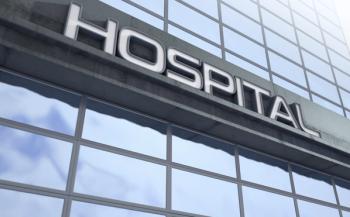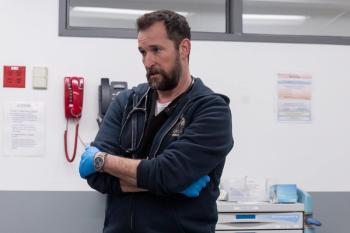
DocGo president Anthony Capone talks about electric ambulances and changing healthcare
The mobile healthcare company unveiled the first electric ambulance this year. Capone told Chief Healthcare Executive that DocGo is a technology company that operates in healthcare.
This ambulance may look like other models, with sirens and white paint, but it is a little different.
DocGo worked with Lightning eMotors, a company that build zero-emission vehicles for commercial fleets, to build America’s first electric ambulance. For its first ride in April, the ambulance transported a patient from Jefferson Abington Hospital in the Philadelphia suburbs to a nursing home.
Since then, the ambulance has been used in other transports for
“It has sparked a lot of interesting discussion,” Capone said.
DocGo has garnered attention for the electric ambulance, but it’s just one facet of the company’s efforts to make its mark in healthcare. DocGo delivers mobile health services to a host of clients, including health systems and insurance providers. The company also provides medical coverage at events, including the Barclays Center in Brooklyn and Citi Field, home of the New York Mets.
The company touts its “last mile mobile care services” as closing the gap between in-person treatment and virtual care.
Capone spoke with Chief Healthcare Executive recently to talk about the company and its goal of helping transform healthcare. He described DocGo, at its core, as a technology company.
“The foundation of who we are is based on technology,” Capone said. “We’re really a technology company. We're a technology company that operates in the healthcare industry.”
The ambulance
Hospitals and health systems are under growing pressure
“They’re almost always on,” he said. “You rarely turn your ambulance off. Your ambulance and mobile health vehicles are pretty much always on for 12 or 14 hours a day. If you’re a gas powered vehicle, you’re producing fumes constantly.”
The electric ambulance gets better mileage in the city, because the braking recharges the battery, and there’s more starts and stops in city driving, Capone said. The ambulance can get around 135 miles on a full charge in the city, and about 110 miles in highway driving.
DocGo aims to run more electric ambulances at health systems in the near future. The company is going to be targeting urban hospitals and health systems initially.
The price point for electric ambulances will have to drop for them to be more widely used, he acknowledged.
A typical ambulance costs about $100,000, but an electric ambulance costs nearly $200,000, Capone said. When the price can get closer to $150,000, he said it will be much more feasible for health systems to make the investment, since the savings in gas and maintenance will offset the higher sticker price, Capone said. He noted electric cars are reaching a price point where they are more attractive to consumers.
DocGo aims to run more electric ambulances at health systems in the near future.
“The electric ambulance is one more example of how DocGo, which is a technology-focused company, solves its problems with technology," Capone said.
In addition, DocGo is aiming to go electric with its entire fleet of several hundred vehicles, including buses, SUVs and other vehicles.
“We’ve committed that our entire fleet by 2032 will be electric,” Capone said.
With unpredictability in gas prices, which soared to $6 or $7 per gallon in some parts of the country over the summer, Capone said he’s hoping that there’s a tipping point where electric vehicles gain greater market share in the next few years. He sees it happening because he said the electric vehicle “really is the future.”
“The pressure on producing electric vehicles is only going to increase substantially,” Capone said.
Aiming to grow
Capone speaks with enthusiasm about his optimism for the growth of DocGo. Its mobile medical division is known as Ambulnz.
“DocGo’s prospects are very very bullish,” Capone said.
Beginning in August, DocGo entered a contract to offer mobile health services to members of Horizon Healthcare Services in New Jersey. The partnership includes Braven Health, a joint venture of Horizon and New Jersey’s biggest health systems - Hackensack Meridian Health and RWJBarnabas Health - that offers Medicare Advantage plans to patients in the Garden State.
DocGo said the agreement with Horizon allows the company to offer its mobile health services to as many as 3.8 million people.
James Dell’Arena, Horizon’s senior director of enterprise network contracting, said in a statement that the arrangement will make it easier for members “to get the care and services they need.”
“DocGo provides Horizon and Braven members with virtual and in-home options to get a wide range of services from annual wellness exams and vaccines to diagnostic tests and evaluations for illnesses,” he said in the statement.
Capone hailed the deal as another step in the company’s growth. “This contract allows us to offer our mobile health services to a substantial number of new patients in New Jersey, furthering our impact in the eastern region of the country,” he said in a statement last month.
On the west coast, DocGo recently brokered a contract with L.A. Care Health Plan to provide mobile health services to Medicare and Medicaid populations in Los Angeles.
Last month, DocGo said its revenue for the second quarter of 2022 increased to $109.5 million, compared to $62.2 million in the same quarter of 2021, a 76% increase.
The company said it plans to add more than 600 clinical and operational positions in the second half of 2022.
Earlier this summer, Capone told Chief Healthcare Executive that bringing clinicians to patients is a way to deliver healthcare more efficiently.
“DocGo’s delivery care model of bringing care to you, whether in your home or group home or shelter …. Our ability to bring that care to them allows us to avoid the extremely expensive care delivered in a hospital setting,” Capone said.





























































































